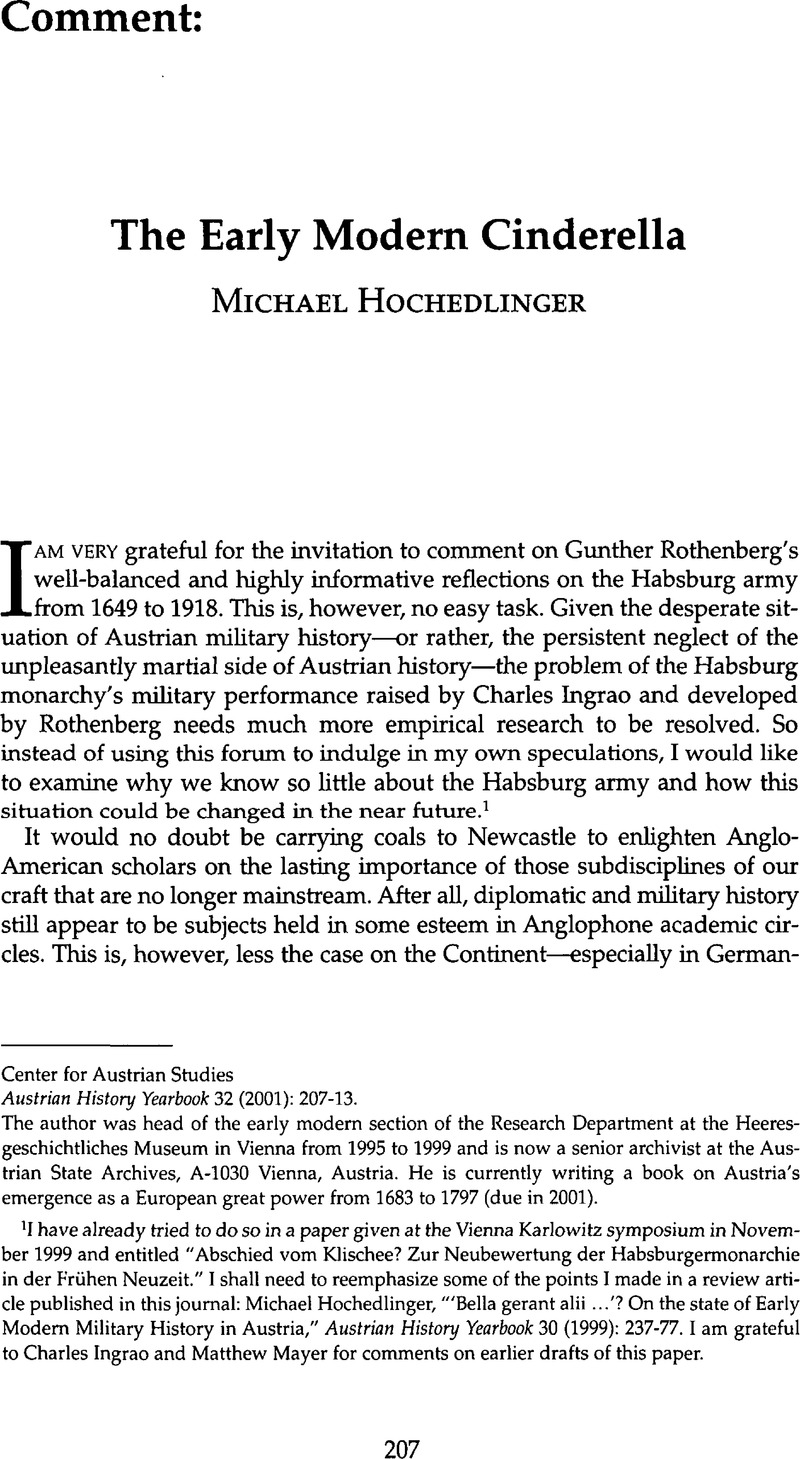Published online by Cambridge University Press: 10 February 2009

1 I have already tried to do so in a paper given at the Vienna Karlowitz symposium in November 1999 and entitled “Abschied vom Klischee? Zur Neubewertung der Habsburgermonarchie in der Frühen Neuzeit.” I shall need to reemphasize some of the points I made in a review article published in this journal: Michael, Hochedlinger, “‘Bella gerant alii …’? On the state of Early Modern Military History in Austria,” Austrian History Yearbook 30 (1999): 237–77.1 am grateful to Charles Ingrao and Matthew Mayer for comments on earlier drafts of this paper.Google Scholar
2 Taylor, A. J. P., The Habsburg Monarchy, 1809–1918: A History of the Austrian Empire and Austria-Hungary (Harmondsworth, Middlesex, 1981), 9.Google Scholar
3 Evans, Robert J. W., The Making of the Habsburg Monarchy, 1550–1700 (Oxford, 1979).Google Scholar
4 Evans, Robert J. W., “Historians and the State in the Habsburg Lands,” in Visions sur le développement des ´etats européens. Th´eories et historiographies de ľétat moderne, ed. Wim, Blokmans and Jean-Philippe, Genet (Rome, 1993), 203–18, quoted at 213,Google Scholar and Evans, , “State and Society in Early Modern Austria,” in State and Society in Early Modern Austria, ed. Charles, Ingrao (West Lafayette, Ind., 1994), 1–23, two important articles that should be required reading for Habsburg historians.Google Scholar
5 Taylor, , Habsburg Monarchy, 247.Google Scholar
6 Schroeder, Paul W., The Transformation of European Politics, 1763–1848 (Oxford, 1994), 50.Google Scholar
7 Michael, Hochedlinger, Krise und Wiederherstellung. Österreichische Groβmachtpolitik zwischen Turkenkrieg und “Zweiter Diplomatische Revolution” 1787–1791 (Berlin, 2000).Google Scholar
8 Jeremy, Black, introduction to European Warfare, 1453–1815, ed. Black, , (New York, 1999), 2.Google Scholar
9 István, Deák, Gunther, Rothenberg, Lawrence, Sondhaus, Alan, Sked, Geoffrey, Wawro, and Tunstall, G. A., to name a few examples. However, it is only fair to record that Christopher Duffy hasdone much to save the honor of eighteenth-century studies, especially with his excellent Army of Maria Theresa (New York, 1977).Google Scholar
10 Charles, Ingrao, “Habsburg Strategy and Geopolitics during the Eighteenth Century,” in East Central European Society and War in the Pre-Revolutionary Eighteenth Century, ed. Rothenberg, Gunther E., Kiralyi, Bela K., and Sugar, Peter F. (New York,1982), 49–66,Google Scholar and Ingrao, , “Conflict or Consensus? Habsburg Absolutism and Foreign Policy, 1700–1748,” Austrian History Yearbook 19/20 (1983/1984): 33–41.CrossRefGoogle Scholar
11 David, Pinkney, “Time to Bury the Pinkney Thesis?” French Historical Studies 17 (1991): 219–23.Google Scholar